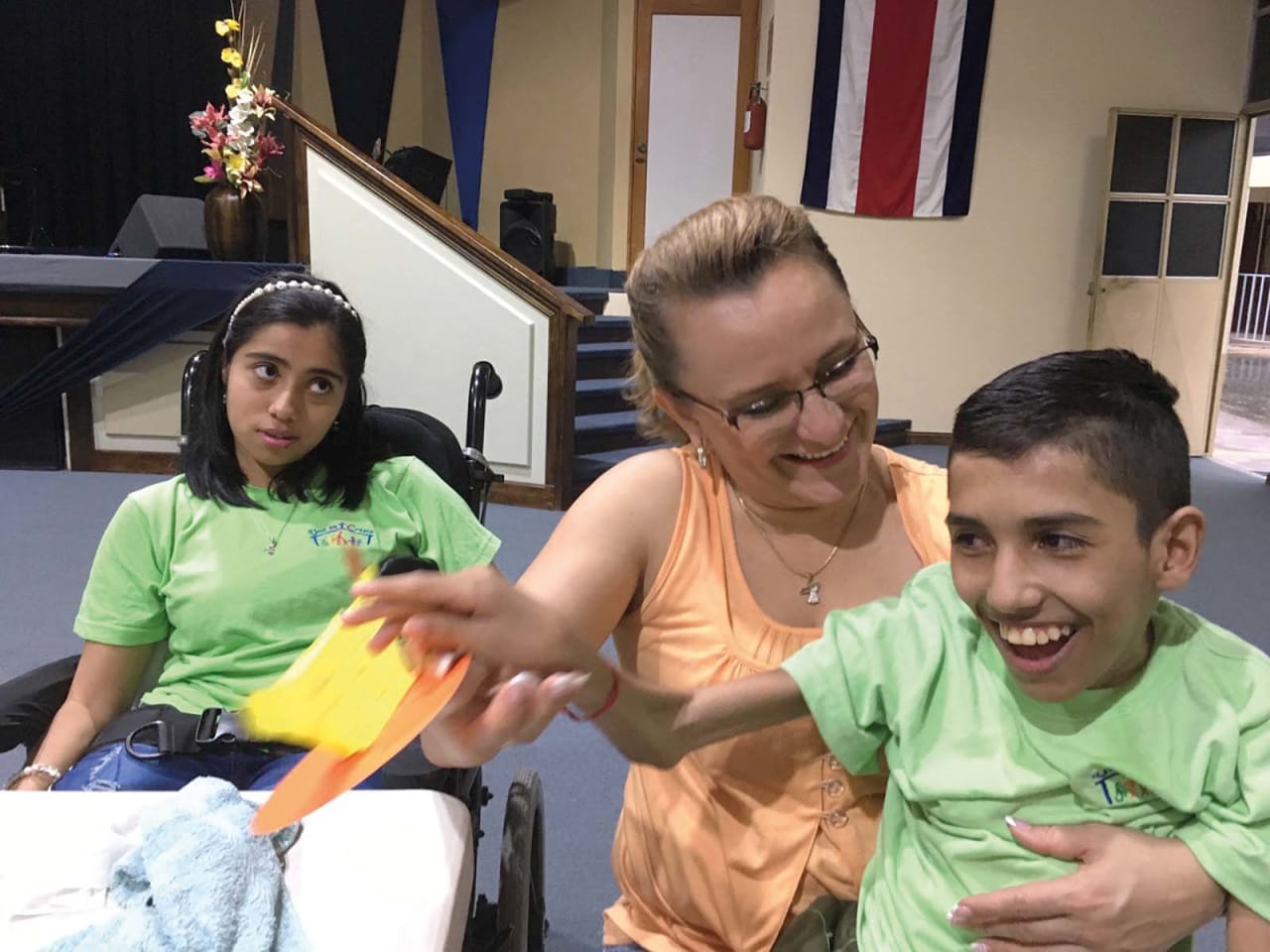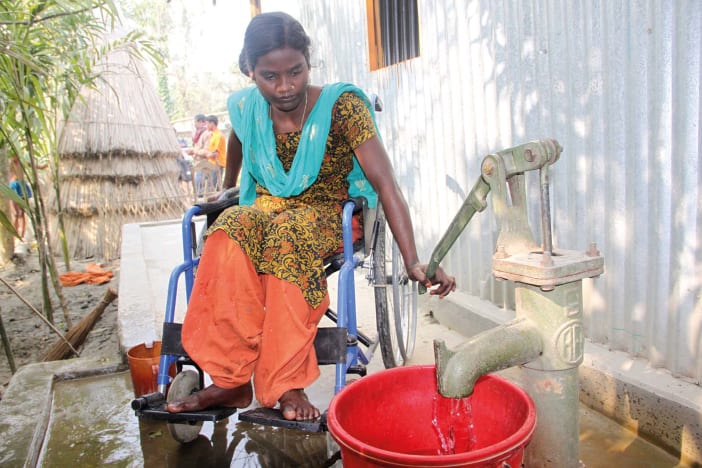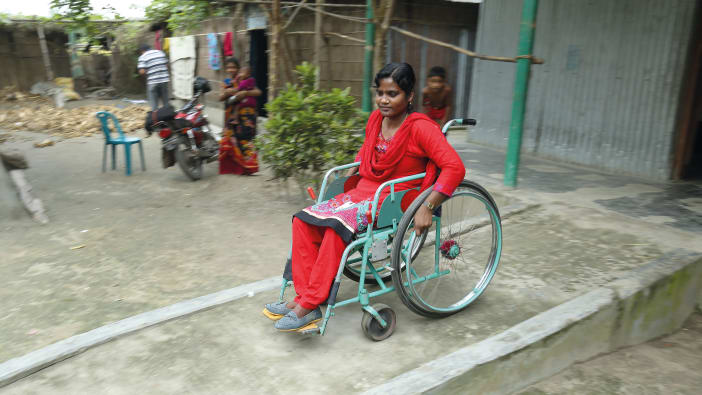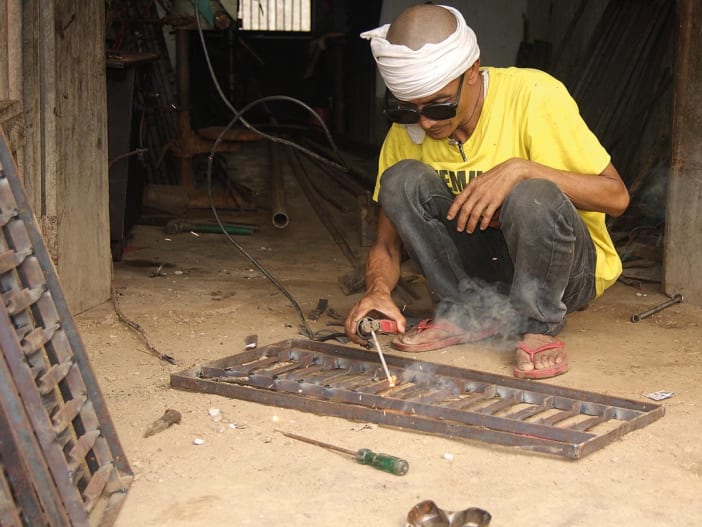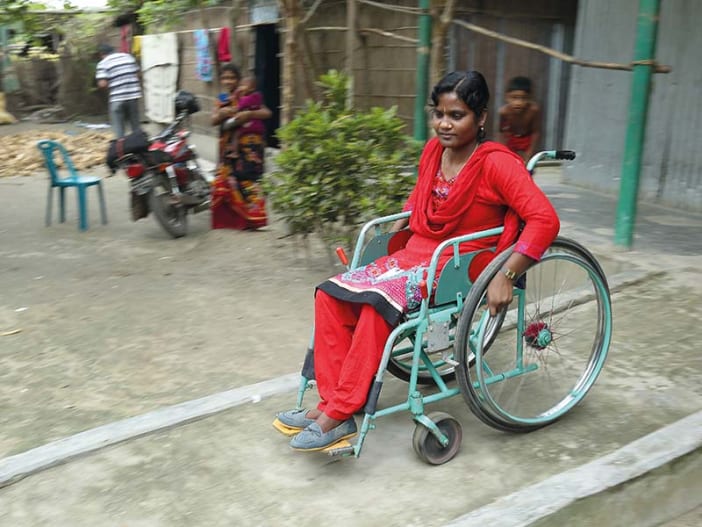Karla (not her real name) was a leader in her church, teaching Sunday school and helping to organise many church activities. Gradually she began to lose her mobility, and felt she could no longer be a leader. Discouraged, she stayed at home. What was the point of going to church? She no longer felt wanted in her congregation and she became depressed.
It wasn’t just that she had to use a wheelchair. What affected Karla most was that she felt pushed aside.
It would be three years before she discovered that God’s love for each person, with or without a disability, is the same. Once she realised this, she felt she had something to offer. She started to attend church again and to teach. She began to work with other people with disabilities, sharing God’s love and helping them to see that they are important and needed in God’s community.
How can we make it easier for people with different kinds of disabilities to participate fully in church and community life? Below are some steps we can take.
Study the Bible to discover important truths
- Diversity is part of creation. We are all made in God’s image (Genesis 1:27–31; Psalm 139:13–16), but we are not all the same.
- We are all needed (see the image of the church as the body of Christ in 1 Corinthians 12, especially verses 21–23).
- Disability is not God’s judgement for sin (John 9: 1–3).
- God is in charge and gives gifts to those he chooses, whether they have a disability or not (Exodus 4:10–12).
Learn more about disability
- At least 15 per cent of the world’s population live with a disability of some kind. This is a huge number of people who are often forgotten and excluded.
- Every person, with or without a disability, is different! We need to forget stereotypes, and learn to appreciate everyone as individuals. There is no ‘them and us’. While few of us are born with a disability, many of us will experience disability at some point in our lives.
- Disabilities may be obvious, or they may be hidden (such as deafness). Learn about the many different types of disability and try to ensure that support is available for everyone who needs it. Be aware that, like Karla, people may be struggling with several types of disability at the same time, eg reduced mobility and depression.
- It is vital to ask people with disabilities how they can be helped to participate. Sometimes people lack confidence and need to be actively encouraged to use their gifts and talents to bless and enrich the church.
Uphold the law
Over the last decade the UN Convention on the Rights of Persons with Disabilities has been adopted by most countries in the world. National laws based on the convention should protect the rights of people with disabilities.
- Check if your country has signed up to this agreement (see below) and find out about your country’s own disability laws. Speak with your church leaders about how important it is for churches to protect and promote the rights of people with disabilities. Encourage them to make any changes that are needed to allow your church to become a place of welcome for all.
- If you feel unsure about using a rights-based approach, look at Leviticus 19:14: ‘Do not curse the deaf… but fear your God.’ This shows us that God wants people with disabilities to be respected. God himself stands up for them.
Be respectful
The UN convention helps us to understand the kind of language we should use. Most people living with disabilities are quite happy to acknowledge that their bodies do not work as they would like, but they prefer others to accept them as they are. Focus on how we respond to them as people, meeting their need for friendship.
- Instead of terms such as ‘the disabled’, ‘handicapped’ or ‘wheelchair-bound’, use ‘people with disabilities’. This helps to shift the focus on to the person and away from their disability.
- Teach children from a young age to be respectful of people with disabilities and never to call names, tease or laugh.
- Talk to each person directly (not through their carer), make eye contact, use their name, smile and be genuine. Do not raise your voice or speak down to them. They will make it clear if they cannot hear you or do not understand what you are saying. Learn as much as you can about how your new friend communicates.
Show love
There are countless ways we can show thoughtful, loving care to those who live with disabilities. They do not want pity but opportunity, and sometimes practical support.
- Form a group to work out how accessible your church is for people with different disabilities. Remember to include people who are living with disabilities as they are the ones who know what really matters to them.
- Make sure adaptations are in place (eg ramps, railings and accessible toilets) so everyone can get into the building and enjoy being there.
- Help provide transport for people who struggle to walk or use public transport. Visit people at home if they cannot get to church.
- Offer friendship to someone who has an intellectual disability and finds it hard to follow the service. Explaining the sermon over a meal in your home can make them feel included.
- Consider learning sign language.
- Greet people at the door and help those with sight loss or limited mobility to find their way around. Clear signs and large print can also help.
Look after families
Often the families of people with severe disabilities become very tired and struggle to cope. They are caring for their loved ones all day, every day, and may receive very little help from the state.
This is where churches can make a significant difference by reaching out to these families and giving them extra support.
- Organise events which allow carers to relax, study the Bible, share their hopes and fears and pray together. Plan activities for the people they look after in a separate room where they can play games and learn more about God.
- Offer practical support: for example, helping with hospital visits, tasks around the home and meals when people are sick.
- Be there for these families and offer genuine love and friendship.
Intellectual disability
An intellectual disability is caused by the way the brain develops before, during or shortly after birth. People with an intellectual disability often take longer to learn and may need support to develop new skills, understand information and interact with other people.
The level of support needed will vary. For example, someone with a mild intellectual disability may only need help with certain things, like getting a job. However, someone with a severe intellectual disability may need full-time care. With the right support, many people with intellectual disabilities can live independent lives.
UN Convention on the Rights of Persons with Disabilities
This is an international legal agreement which exists to protect and promote the human rights of people with disabilities. Since 2006 it has been signed by most nations in the world. It recognises ‘the importance of accessibility to the physical, social, economic and cultural environment, to health and education and to information and communication, in enabling persons with disabilities to fully enjoy all human rights and fundamental freedoms’.
Visit www.un.org to see if your country has signed up to this agreement. The convention is available to download in multiple languages, large print and in the form of sign language videos.


